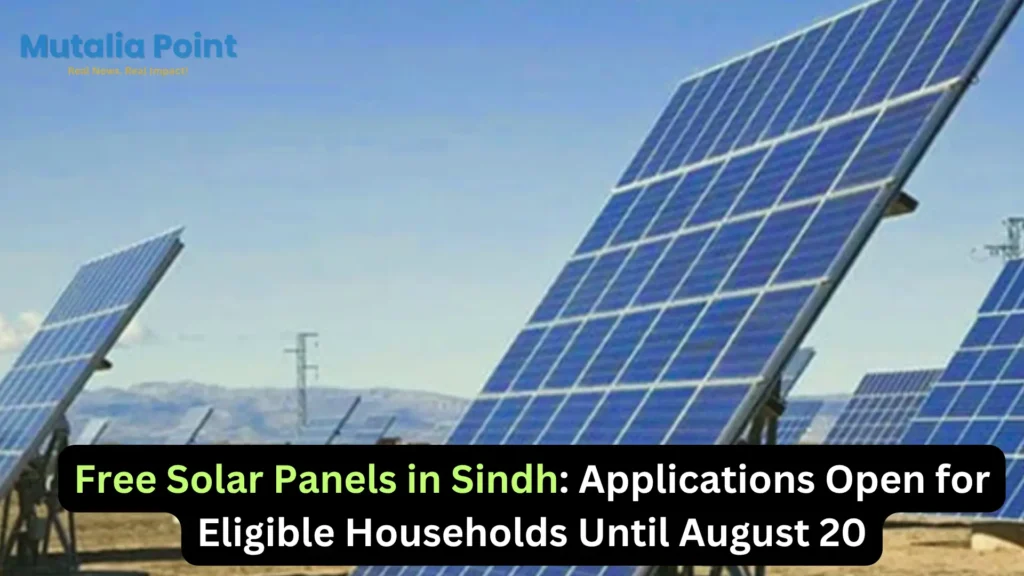Free solar panels in Sindh are now within reach for thousands of low-income households as the Sindh government has officially opened the application process for its ambitious solar energy program. Targeted at families consuming up to 100 units of electricity per month, the initiative is part of a larger effort to tackle rising energy costs while promoting environmentally friendly energy solutions.
The Sindh Energy Department confirmed that applications for the free solar panel scheme are being accepted until August 20, encouraging eligible consumers to apply within the deadline. The program aims to ease the financial burden of electricity bills and increase access to renewable energy among economically disadvantaged communities.
Solar Energy Program Aims to Support 200,000 Families
Under this initiative, the provincial government plans to provide solar panels to 200,000 households. According to official data from the Sindh Assembly, 77,000 households have already received solar systems, with 123,000 more families expected to benefit in the upcoming phase. However, due to growing interest in the scheme, the number of applications may exceed available slots. In such cases, a lottery system will be used to determine the final list of recipients.
Sindh’s Energy Minister Syed Nasir Hussain Shah reaffirmed the provincial government’s commitment to expanding affordable and clean energy access. Speaking at a recent ceremony at the Energy Department office—organized in collaboration with a private firm—the minister highlighted the display of solar home systems, lithium battery inverters, and solar panels, all tailored for household usage.
He emphasized that the government is determined to offer alternatives to costly fossil-fuel-generated electricity. “Our clear position is that we must move away from expensive electricity produced through fossil fuels and embrace solar and hybrid alternatives,” Shah said.
The government has also announced that if demand outpaces supply, transparent and fair procedures—like random selection—will be implemented to ensure equal opportunity for all eligible applicants.
Sindh’s Broader Shift to Renewable Energy
The push for free solar panels in Sindh is part of a broader energy strategy. The province recently completed two solar park projects, with electricity from these facilities offered at significantly lower tariffs. In addition, Sindh established its first public-private partnership power plant, which continues to deliver low-cost electricity through the Sindh Transmission and Dispatch Company (STDC).
Minister Shah also pointed out that the monitoring of electricity tariff structures has intensified to ensure fair pricing. “We are keeping a close eye on how companies are setting tariffs. Our goal is to keep electricity affordable for the people of Sindh,” he said.
These initiatives reflect a clear shift towards sustainable energy development in Pakistan. Transitioning to solar energy not only helps reduce dependence on imported fuels but also offers long-term savings for households and reduces environmental impact.
In another encouraging development, a Chinese energy firm is planning to build 425MW wind and solar plants in Sindh, a move expected to further solidify the province’s position as a leader in renewable energy adoption.
For many low-income families, these efforts represent a significant opportunity to improve their standard of living. By reducing monthly utility bills and enhancing access to reliable electricity, the government aims to foster a more inclusive and energy-resilient society.
Moreover, experts say the growing adoption of solar solutions can drive economic empowerment, creating opportunities in installation, maintenance, and energy management services. In regions like Sindh, where power outages and high bills have long posed challenges, solar energy is not just an environmental solution but an economic one.
Application Process and How to Apply
Households interested in applying for free solar panels in Sindh should check their monthly electricity consumption. Only those who consume 100 units or fewer per month are eligible. The deadline for applications is August 20, and applicants are encouraged to apply through official government portals or local energy offices to ensure proper registration.
This initiative aligns with global trends emphasizing clean energy adoption. Programs like this, especially when supported through public-private partnerships, hold the potential to reshape Pakistan’s energy future.
For further insights into Pakistan’s ongoing renewable energy projects, you can visit Alternative Energy Development Board (AEDB) or track local updates from the Sindh Energy Department.















